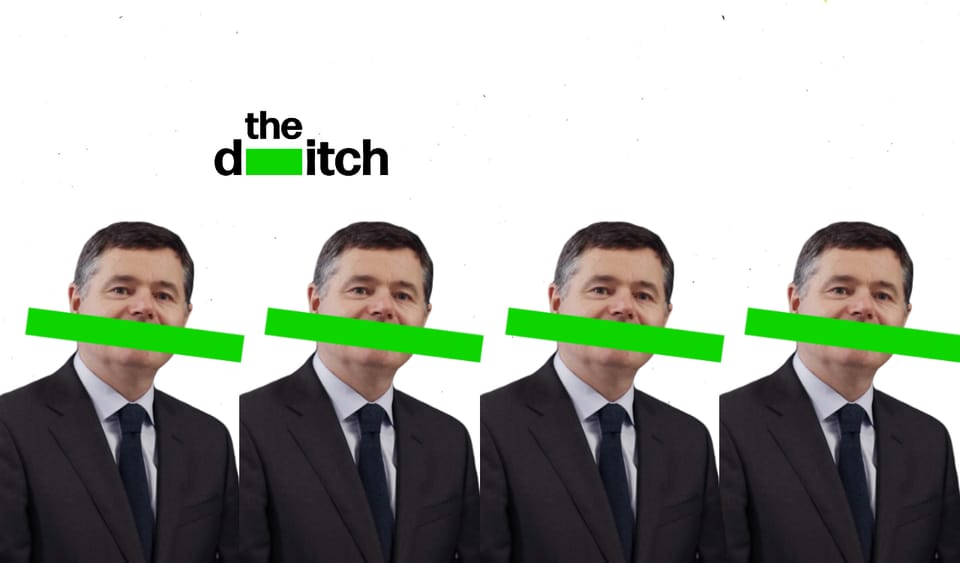It was up to Paschal Donohoe to answer parliamentary questions last Tuesday.
This meant he spent his time in the Dáil defending government against embarrassing scandals. There was the National Children's Hospital's construction costs, now at €2.4 billion. There were the taoiseach's recent remarks claiming immigration is partly to blame for record homelessness levels. And there was the ongoing issue of multiple airlines illegally flying tonnes of munitions through Irish sovereign airspace, as reported by The Ditch over the past month.
On the illegal flights Donohoe repeated the government line: Ireland isn't complicit in Israeli war crimes – which according to an interim International Court of Justice ruling may include genocide – and it is reckless to suggest otherwise.
“Even in matters of such importance, the deputy cannot park his normal tactics of allegation and division,” said Donohoe, in response to a question by People Before Profit TD Paul Murphy about alleged Irish facilitation of war crimes in Palestine. “The deputy is looking to create a sense of some kind of tacit support for the passage of anything through our airspace.”
On Wednesday The Ditch reported that in February 2019, Donohoe, then finance minister, took part in a phone call with his Israeli counterpart, Moshe Kahlon. It was, according to a senior official in the Israeli Ministry of Justice, “a confidential call on 13 February” in which Donohoe “confirmed that the Irish government will be using a procedure known as ‘money message’ to seek to block the progress” of the stalled Occupied Territories Bill. Donohoe didn’t record the call in his diary.
Donohoe denied the interaction ever occurred, while his colleague Micheál Martin told Newstalk that Donohoe "can't recall" it. Martin later told the Dáil that Donohoe is “clear that he did not make any such phone call.”
There are two possible explanations: the Israeli government lied in its own internal correspondence about assurances the Irish government gave about a proposed economic boycott; or Donohoe is not telling the truth about making an off-record phone call.
When considering Ireland's historic stance on Palestine, Donohoe's actions are yet further confirmation of what we already knew: the government is an obstacle to Irish solidarity with the people of Gaza and the West Bank.
Nothing that might deter foreign direct investment
It’s straightforward why government doesn’t take material action against Israel despite overwhelming public support for Palestine across Ireland.
Fine Gael, Fianna Fáil and the Green Party are not entirely devoid of – though they are certainly greatly lacking in – sympathy for Palestinians being massacred by the Israel Defence Forces. Their attitude towards Palestine stems from political cowardice, a reluctance to take any action they believe may alienate the United States and EU, anything that might deter foreign direct investment, upon which the Irish economy relies.
This cowardice accounts for much of government’s attitude toward Palestine. It gives context for instances like Simon Coveney's refusal to draw parallels between Ukrainian resistance to Russian invasion and Palestinian resistance to Israel. It clarifies Micheál Martin's decision to pose next to a hole in an Israeli roof as Gazan civilians, now confirmed dead in their tens of thousands, endured a murderous bombing campaign. It makes sense of the state’s refusal to monitor Irish airspace as civilian planes carrying tonnes of Israel-bound weapons flew overhead.
And it suggests why Paschal Donohoe might take part in a secret phone call to the Israeli government to assure it that Fine Gael would block the Occupied Territories Bill.
We deal in symbolic gestures
Understanding how states work in their perceived material interests can also help us understand an unmistakable discrepancy that emerged after the Israeli invasion of Gaza.
Over the past two years a vocal faction of conflict enthusiasts have called for a "realistic," "sensible," and "mature" discussion about Irish neutrality. This group includes government ministers, NATO-loving international relations experts and lazy broadsheet defence correspondents terminally reliant on official sources. They argue for abandoning Ireland's long-standing policy of not fighting in foreign wars, citing growing threats of Russian interference in Irish democracy and potential future violations of Irish sovereignty. Yet these same voices have been quiet about multiple airlines repeatedly breaking Irish law by transporting weapons to a country against which Ireland intends to intervene in an International Court of Justice genocide case. And they have little to say about Israel’s attempt to interfere in Irish parliamentary processes in relation to the Occupied Territories Bill.
Militarising the economy isn’t about bolstering Irish sovereignty or freeing us to defend besieged and brutalised peoples across the world. It’s about further alignment with the western war machine, about consolidating our status as a US client state featuring an airfield for American war planes and a theme park for American tourists. If government truly cared about establishing an independent foreign policy, it would do something about the greatest impediment to Irish sovereignty we face: our subordination to foreign capital.
How the state, its custodians and their allies operate: publicly claiming noble motives while quietly serving the interests of capital or their own agenda. For more than a decade, government has claimed it is working to solve the housing crisis, a claim that is clearly untrue, as landlords yield record profits and ever-increasing numbers of young people are left in their family homes. It created a redress scheme for homeowners affected by the mica scandal designed to short-change those impacted. It attempted to pass a referendum the Attorney General warned might degrade the rights of carers under the guise of removing antiquated language from the constitution. Ministers boast about climate targets yet fail to meet even modest emission reduction goals, subjecting Ireland to huge future fines.
Ireland's approach to Gaza and the West Bank is no different. We deal in symbolic gestures, made in conjunction with other countries, while refusing to implement a single sanction on the apartheid state of Israel. Our politicians grandstand about doing something while munitions used to slaughter women and children fly overhead.
The comprador political class will never value Palestinian human rights more than it values capital, more than it values the approval of the United States and EU. Unless people like Paschal Donohoe face real scrutiny, Ireland's stance on Palestine will remain a performance without anything meaningfully helpful to a people subjected to an attempted extermination.


